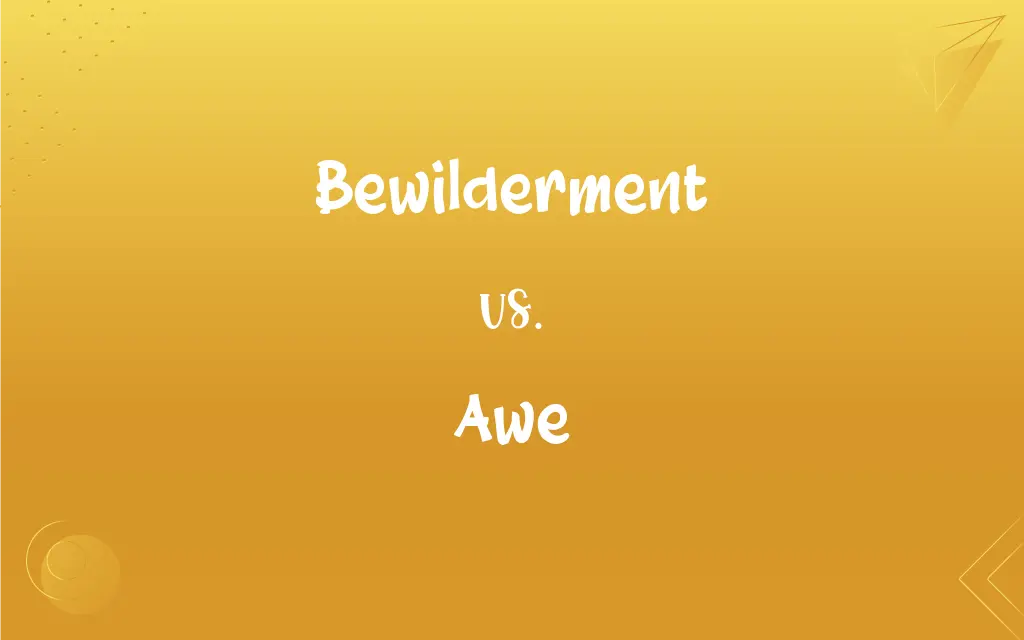Bewilderment vs. Awe: What's the Difference?
By Aimie Carlson & Harlon Moss || Updated on May 20, 2024
Bewilderment is a state of confusion or puzzlement, while awe is a feeling of reverence mixed with wonder. Bewilderment leaves you perplexed; awe leaves you inspired.

Key Differences
Bewilderment involves a state of confusion or perplexity, often resulting from something unexpected or difficult to understand. This feeling can arise in situations where the circumstances are unclear or when encountering something completely unfamiliar. On the other hand, awe is characterized by a profound sense of reverence or wonder, typically inspired by something grand or sublime.
When someone experiences bewilderment, they may feel disoriented and unsure of how to proceed. This state can be caused by complex problems or contradictory information. Whereas, awe usually stems from an encounter with something majestic or powerful, leading to admiration and sometimes speechlessness.
In social interactions, bewilderment can result in awkwardness or hesitancy, as individuals struggle to comprehend the situation. Conversely, awe often fosters a sense of unity or shared amazement, bringing people together through a mutual appreciation of something extraordinary.
Psychologically, bewilderment may trigger a need for resolution or understanding, prompting analytical thinking. Meanwhile, awe tends to evoke a sense of humility and can expand one's perspective, making them feel part of something larger than themselves.
Comparison Chart
Emotional State
Confusion and puzzlement
Reverence and wonder
ADVERTISEMENT
Cause
Unexpected or unclear situations
Majestic or sublime experiences
Psychological Effect
Disorientation and need for clarity
Humility and expanded perspective
Social Interaction
Awkwardness and hesitancy
Unity and shared amazement
Typical Triggers
Complex problems, contradictions
Grand natural phenomena, impressive art
Bewilderment and Awe Definitions
Bewilderment
A state of confusion or puzzlement.
She stared at the complex instructions in bewilderment.
ADVERTISEMENT
Awe
A feeling of reverence and wonder.
The sight of the Grand Canyon filled him with awe.
Bewilderment
An inability to understand or make sense of something.
His sudden disappearance left us all in bewilderment.
Awe
A profound emotional state elicited by greatness.
They watched in awe as the fireworks lit up the sky.
Bewilderment
A feeling of being perplexed by unexpected events.
The student's bewilderment was evident when the teacher asked an unusual question.
Awe
Deep admiration for something grand or noble.
The student's awe of her mentor was evident in her dedication.
Bewilderment
Confusion due to contradictory information.
The conflicting reports caused widespread bewilderment among the public.
Awe
A feeling of respect or reverence mixed with dread and wonder, often inspired by something majestic or powerful
"There was a fierce purpose in the gale ... that seemed directed at him, and made him hold his breath in awe" (Joseph Conrad).
Bewilderment
The state of being lost or disoriented mentally.
The tourist wandered through the city in bewilderment, unable to find the hotel.
Awe
The power to inspire dread.
Bewilderment
The condition of being confused or disoriented.
Awe
Dread.
Bewilderment
A situation of perplexity or confusion; a tangle
A bewilderment of lies and half-truths.
Awe
To fill with awe
Tourists who are awed by the ancient monument.
Bewilderment
The state of being bewildered.
She looked around in bewilderment.
Awe
A feeling of fear and reverence.
Bewilderment
A confusing or perplexing situation.
Awe
A feeling of amazement.
Bewilderment
The state of being bewildered.
Awe
(archaic) Power to inspire awe.
Bewilderment
A bewildering tangle or confusion.
He . . . soon lost all traces of it amid bewilderment of tree trunks and underbrush.
Awe
(transitive) To inspire fear and reverence in.
Bewilderment
Confusion resulting from failure to understand
Awe
(transitive) To control by inspiring dread.
Awe
Dread; great fear mingled with respect.
His frown was full of terror, and his voiceShook the delinquent with such fits of awe.
Awe
The emotion inspired by something dreadful and sublime; an undefined sense of the dreadful and the sublime; reverential fear, or solemn wonder; profound reverence.
There is an awe in mortals' joy,A deep mysterious fear.
To tame the pride of that power which held the Continent in awe.
The solitude of the desert, or the loftiness of the mountain, may fill the mind with awe - the sense of our own littleness in some greater presence or power.
Awe
To strike with fear and reverence; to inspire with awe; to control by inspiring dread.
That same eye whose bend doth awe the world.
His solemn and pathetic exhortation awed and melted the bystanders.
Awe
An overwhelming feeling of wonder or admiration;
He stared over the edge with a feeling of awe
Awe
A profound emotion inspired by a deity;
The fear of God
Awe
Inspire awe in;
The famous professor awed the undergraduates
Awe
An overwhelming sense of admiration or respect.
She listened in awe to the virtuoso performance.
Awe
A mix of fear and respect, often in response to something powerful.
The ancient temple inspired awe in all who visited it.
FAQs
What is the primary difference between bewilderment and awe?
Bewilderment is characterized by confusion and puzzlement, while awe is marked by reverence and wonder.
Is awe always associated with positive experiences?
Awe is usually a positive emotion, though it can also involve a mix of fear and respect.
What physical reactions are associated with awe?
Awe can cause physical reactions such as goosebumps, a feeling of expansiveness, or even tears of admiration.
Is awe considered a complex emotion?
Yes, awe is a complex emotion that blends elements of admiration, reverence, and sometimes fear.
How does cultural context influence the experience of awe?
Cultural context can shape what is considered awe-inspiring, such as natural wonders, religious experiences, or technological achievements.
Can bewilderment be a positive emotion?
Bewilderment is typically a neutral or negative emotion, stemming from confusion or lack of understanding.
How do people typically respond to feelings of bewilderment?
People often seek clarity or understanding to resolve their confusion when experiencing bewilderment.
What are common triggers for feelings of awe?
Awe is commonly triggered by grand natural phenomena, impressive artistic performances, or significant achievements.
Can bewilderment lead to positive outcomes?
Bewilderment can lead to positive outcomes if it prompts problem-solving and deeper understanding.
Does awe have any long-term psychological benefits?
Awe can have long-term psychological benefits, such as increased well-being and a greater sense of connection to the world.
Is awe more commonly experienced in group settings or alone?
Awe can be experienced both alone and in group settings, though shared experiences can amplify the feeling.
How might someone express bewilderment?
Expressions of bewilderment include puzzled looks, questions, or verbal expressions of confusion.
Can animals experience bewilderment or awe?
Animals can experience confusion similar to bewilderment, but awe, which involves complex emotional and cognitive responses, is less certain.
Can bewilderment be mistaken for another emotion?
Bewilderment can sometimes be mistaken for anxiety or frustration due to its association with confusion.
How do different languages and cultures describe awe and bewilderment?
Different languages and cultures have unique words and expressions to describe awe and bewilderment, reflecting their distinct cultural experiences and values.
What role does curiosity play in bewilderment?
Curiosity often accompanies bewilderment, driving the individual to seek answers and resolve their confusion.
Can awe be experienced in everyday life?
Yes, awe can be experienced in everyday life through unexpected acts of kindness, artistic beauty, or nature.
Can awe inspire creativity?
Yes, awe can inspire creativity by opening up new perspectives and stimulating the imagination.
How do children typically express bewilderment?
Children often express bewilderment through questions, wide-eyed looks, or seeking help from adults.
What is a common expression for someone feeling awe?
Common expressions for someone feeling awe include gasps, exclamations of amazement, or silent admiration.
About Author
Written by
Aimie CarlsonAimie Carlson, holding a master's degree in English literature, is a fervent English language enthusiast. She lends her writing talents to Difference Wiki, a prominent website that specializes in comparisons, offering readers insightful analyses that both captivate and inform.
Co-written by
Harlon MossHarlon is a seasoned quality moderator and accomplished content writer for Difference Wiki. An alumnus of the prestigious University of California, he earned his degree in Computer Science. Leveraging his academic background, Harlon brings a meticulous and informed perspective to his work, ensuring content accuracy and excellence.































































